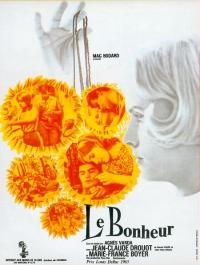Le Bonheur (1965 film)
Le Bonheur Happiness is a 1965 French drama film directed by Agns Varda. The film is associated with the French New Wave and won two awards at the 15th Berlin International Film Festival, including the Jury Grand Prix. The films beautiful colours resulted from the creation of a new colour negative because the original had faded during production.
This French film was released in 1965 while the country was led under the guidance of Charles de Gaulle, elected in December of 1958 as president over the newly created Fifth Republic of which he helped form. In the wake of World War II and after a long fight with their Algerian colony that ultimately lead to an Algerian independence in 1962, France was in the process of implementing de Gaulles policy of grandeur that would help to counterbalance the existing world superpowers of the United States and the Soviet Union and create a strong, independent French foreign policy that desired to produce a united Europe. In addition to creating a strong French nation that could counter the power of the United States and Soviet Union that were themselves engaged in the Cold War, this policy also aimed to develop the French economy through a system with both capitalist and socialist components that eventually led to a gross national product GNP per capita in 1964 that exceeded that of the United Kingdom. Le Bonheur was released prior to massive social unrest within the nation of France that reached its peak in 1968 and that threatened to overthrow the still new Fifth Republic. This film contains many feminist elements that reflect the movements that were taking place among women during that time. These feminist movements emphasized consciousness raising among women that encouraged the female population to refuse to be silent and to act in their own interests, an idea that embodied the words of French feminist Simon de Beauvoir, author of The Second Sex, when she stated that womens identity was a social construct that stood in the way of full equality. During this time, the demographics of the French nation revealed low marriage rates, high divorce rates, increased births outside of the confines of marriage, and a general increase in female employment.
Source: Wikipedia

